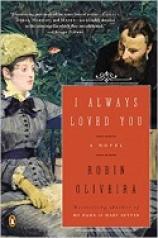Reading Group Guide
Discussion Questions
I Always Loved You

1. In Robin Oliveira’s novel, it’s clear that Mary Cassatt and Edward Degas genuinely loved each other. Might they have found happiness in marriage? Would their art have been diminished or elevated by the relationship?
2. It seems extraordinary that one organization, the École des Beaux Arts, once held such power in determining what was considered “good” art. Yet in our own era, an exhibition at the Museum of Modern Art will attract more reviews and attendees than any show in an independent gallery. Does this kind of official validation ultimately have a positive or negative effect on art, literature, music and other creative commodities?
3. After she meets Degas, Cassatt thinks, “People were always asking artists that inane question. Don’t ask me how I do what I do…But hadn’t she asked Degas the same thing in his studio?” (p. 112) Why are we drawn to understand other people’s creative processes?
4. Mary Cassatt’s father, Robert, is indifferent to the needs of anyone beside himself. To what extent did his attitude toward the women in his family influence Mary’s attitudes toward marriage and her relationship with Degas?
5. While Mary Cassatt is still struggling to make her name, her father asks her, “What is the purpose of any endeavor if not to make money? And how does an artist tell whether or not he is successful?” (p. 130) How would you answer his questions?
6. As depicted in Oliveira’s novel, many legendary artists --- not to mention the writers Émile Zola and Stéphane Mallarmé --- were part of the same circle. How did their association help them achieve success? Do you think all of them would have achieved fame independently?
7. Degas treated his “rat,” Marie, quite cruelly while she modeled for his wax sculpture of a ballet dancer. Does great art justify the collateral damage of its creation?
8. The novel intimates that Édouard Manet married his father’s mistress and that Berthe Morisot married Édouard’s brother, Eugène. Do you empathize with their decisions?
9. So many of Cassatt’s later paintings capture the love between mother and child. Yet she herself was childless. Do you think she could really understand this particular form of love? Why or why not? If you were a woman living in an era when childbirth put your health --- and often your life --- at risk, do you think you would have been willing to take that chance?
10. Manet died at the height of his powers, whereas Degas lived for years unable to create. In your opinion, which artist suffered the worse fate?
11. To whom does the novel’s title, I ALWAYS LOVED YOU, refer?
I Always Loved You
- Publication Date: February 4, 2014
- Genres: Art, Fiction, Historical Fiction, Literary Fiction
- Hardcover: 352 pages
- Publisher: Viking
- ISBN-10: 0670785792
- ISBN-13: 9780670785797








